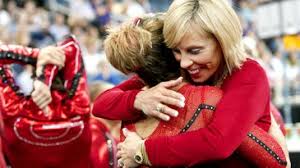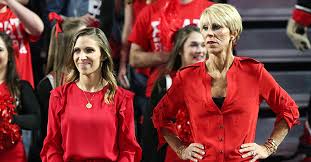Coach Yoculan built great teams year after year. She was able to unite great individual high-performance athletes with their own personal goals into Championship Teams. In her book, Perfect 10 with Bill Donaldson, Coach Yoculan recounted her approach:
"We believe that the happier the athlete is, the better she's going to do. I like to accommodate the individual needs of the girls. We always say we're a team of individuals first, and that if we meet the individual needs of the girls and work on leadership skills at the same time, then we will develop a TEAM.
I don't like to be a real controlling coach when it comes to the little things; I want to give our athletes information and then allow them to make choices. In general, I treat them as individuals. It's important to me that I respect their individual needs. All gymnasts are different. We build our team chemistry by getting to know each other and developing a mutual respect for those differences.
I believe you must assure every team member that you are inter¬ested in her as a person as well as a gymnast and that you believe that she can reach the goals agreed on. Students have a life other than gymnastics. It is important that their worries and concerns be addressed, and that coaches play the appropriate role in deciding what is best for the gymnast. What is best for the gymnasts is best for the team.
The physical and mental welfare of student-athletes must take priority over all other considerations. Strength and conditioning are the keys to good performance and longevity in gymnastics. Learn what works and apply it, always giving the gymnast's wellbeing top priority."
Coach Yoculan's gymnasts knew she would not sacrifice their well being for her own personal interests. She was the boss who you knew would be genuinely happy if you got a job with a different company if it was better for your family. Trust between the Coach and team members is the starting point for all team building. Susan Yoculan would get an A+ in trust from her gymnasts.
What grade would your team members give you?



 RSS Feed
RSS Feed